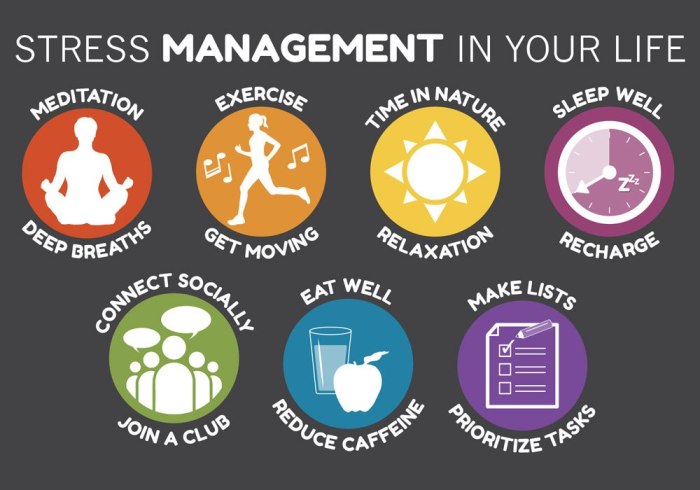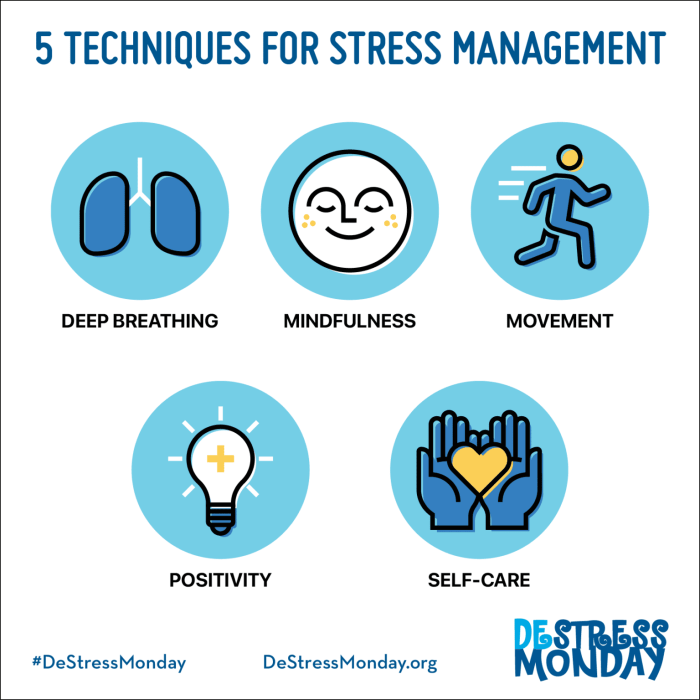Stress Management Tips takes center stage, inviting you into a world of knowledge with a hip American high school flair. Get ready for a unique and absorbing read.
Let’s dive into effective strategies for stress relief, the importance of healthy habits, the power of mindfulness, and the key to managing time like a pro.
Stress Management Techniques

Feeling overwhelmed with stress? Here are some effective strategies to help you manage and reduce stress in your daily life.
Deep Breathing Exercises
One simple yet powerful technique to combat stress is deep breathing exercises. Take slow, deep breaths in through your nose, hold for a few seconds, and then exhale slowly through your mouth. Repeat this process several times to help calm your mind and body.
Mindfulness Meditation
Practicing mindfulness meditation involves focusing on the present moment without judgment. This can help reduce stress by allowing you to let go of worries about the past or future. Find a quiet space, sit or lie down comfortably, and focus on your breath or a specific mantra.
Physical Exercise
Engaging in physical exercise, such as yoga, running, or dancing, can be a great way to relieve stress. Exercise releases endorphins, which are known as “feel-good” chemicals that can improve your mood and reduce stress levels.
Healthy Eating Habits
Eating a well-balanced diet with plenty of fruits, vegetables, whole grains, and lean proteins can help support your overall health and reduce stress. Avoid excessive caffeine, sugar, and processed foods, as they can contribute to feelings of anxiety and stress.
Quality Sleep
Prioritize getting enough quality sleep each night, as lack of sleep can increase stress levels and negatively impact your mental and physical health. Create a relaxing bedtime routine, limit screen time before bed, and ensure your sleeping environment is comfortable and conducive to rest.
Healthy Lifestyle Habits
Incorporating healthy lifestyle habits is essential for effective stress management. These habits can significantly impact your overall well-being and help you cope with stress in a more balanced manner.
Role of Exercise in Reducing Stress
Regular physical activity plays a crucial role in reducing stress levels. Exercise helps release endorphins, also known as “feel-good” hormones, which can improve your mood and reduce feelings of anxiety and stress. Whether it’s going for a run, practicing yoga, or hitting the gym, finding an exercise routine that works for you can be a powerful tool in managing stress.
Maintaining a Balanced Diet to Alleviate Stress
Eating a well-balanced diet rich in nutrients can help alleviate stress. Certain foods, such as fruits, vegetables, whole grains, and lean proteins, can provide essential vitamins and minerals that support your body’s ability to handle stress. Avoiding excessive caffeine, sugar, and processed foods can also contribute to a more stable mood and energy levels.
Significance of Sleep in Managing Stress Levels
Getting an adequate amount of quality sleep is crucial for managing stress levels. Lack of sleep can make you more susceptible to stress and negatively impact your ability to cope with daily challenges. Establishing a bedtime routine, creating a comfortable sleep environment, and practicing relaxation techniques before bed can help improve the quality of your sleep and reduce stress.
Mindfulness and Meditation: Stress Management Tips
Mindfulness and meditation are powerful tools that can help reduce stress and promote overall well-being. By practicing mindfulness, individuals can learn to focus on the present moment without judgment, allowing them to let go of worries about the past or future. Meditation, on the other hand, involves techniques that promote relaxation and inner peace, helping individuals to calm their minds and bodies.
Benefits of Mindfulness in Stress Reduction
- Increases self-awareness and emotional regulation
- Reduces anxiety and depression symptoms
- Improves focus and concentration
- Promotes better sleep quality
Meditation Techniques for Relaxation
- Deep breathing exercises
- Body scan meditation
- Loving-kindness meditation
- Guided visualization
How Mindfulness Practices Help in Stressful Situations, Stress Management Tips
- Encourages a non-reactive response to stressors
- Increases resilience and coping mechanisms
- Enhances overall sense of well-being
Examples of Mindfulness Exercises for Beginners
- Body scan: Focus on each part of your body, starting from your toes to the top of your head, noticing any sensations without judgment.
- Deep breathing: Inhale deeply through your nose, hold for a few seconds, and exhale slowly through your mouth, focusing on your breath.
- Mindful walking: Pay attention to each step you take, the sensations in your feet, and the environment around you.
Time Management

Time management plays a crucial role in reducing stress levels and improving overall well-being. By effectively managing our time, we can prioritize tasks, set boundaries, and achieve a better work-life balance.
Prioritizing Tasks
- Start by creating a to-do list with all your tasks for the day.
- Identify the most important and urgent tasks that need to be completed first.
- Break down larger tasks into smaller, more manageable steps.
- Avoid multitasking and focus on one task at a time to increase productivity.
Setting Boundaries
- Learn to say no to additional tasks or commitments that will overwhelm your schedule.
- Establish specific work hours and personal time to maintain a healthy balance.
- Avoid checking work emails or messages outside of designated work hours.
- Create a dedicated workspace to improve focus and limit distractions.
Effective Time Management Techniques
- Use time blocking to allocate specific time slots for different tasks or activities.
- Utilize technology tools like calendar apps or task management apps to stay organized.
- Delegate tasks when possible to lighten your workload and reduce stress.
- Take regular breaks to rest and recharge, improving productivity and mental clarity.


